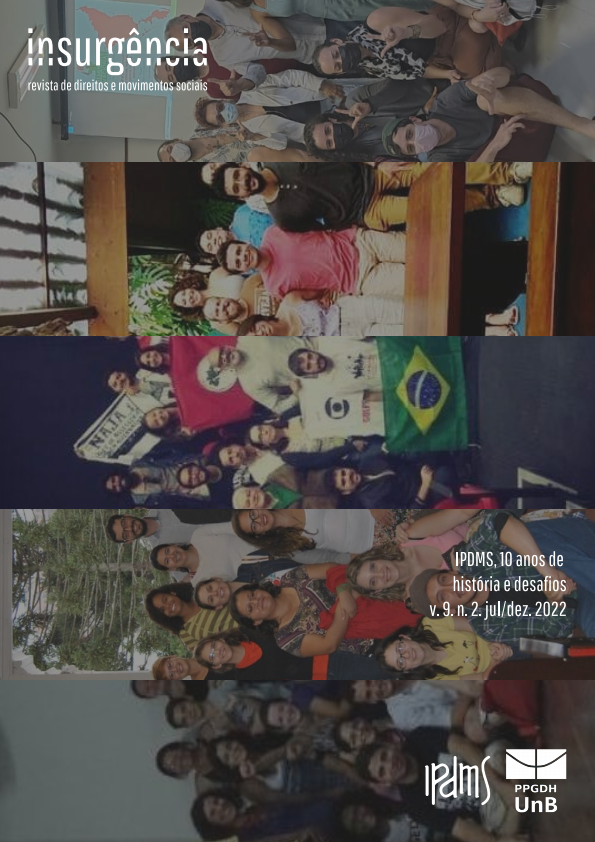Lutas socioambientais e os desafios da pesquisa-ação junto aos movimentos populares
DOI:
https://doi.org/10.26512/revistainsurgncia.v8i2.43515Palavras-chave:
Pesquisa-ação, conflitos socioambientais, resistênciasResumo
Nos dez anos de existência do Instituto de Pesquisa, Direitos e Movimentos Sociais nos parece importante refletir sobre as formas de pensar a pesquisa-ação a luz das lutas socioambientais que vêm marcando a organização de movimentos populares no Brasil. Ao longo dos anos 90 a questão ambiental é incorporada pelo discurso hegemônico através da noção de desenvolvimento sustentável, consolidada na promoção da economia verde. Assim se torna possível pensar na continuidade da produção capitalista incorporando a Natureza, não mais como uma externalidade, mas parte do avanço da mercantilização. Em resistência a isso movimentos populares históricos, bem como novas formas organizativas, especialmente de juventude, têm se articulado para uma politização da questão ambiental, que consiga conectar a luta antissistêmica pela construção de uma sociedade mais justa e igualitária, com a continuidade da vida no planeta terra. Tem-se como pressuposto que esses movimentos trazem inovações nos processos de relação com a pesquisa-ação, já que marcados pela presença de pluralidade de atores, e das relações entre escalas locais e globais. Desse modo o artigo pretende trazer algumas reflexões preliminares sobre essas inovações para pensar o campo de ação dos pesquisadores do Instituto.
Referências
ACSELRAD, Henri. Ambientalização das lutas sociais – o caso do movimento por justiça ambiental. Estudos Avançados, São Paulo, v. 24, n. 68, p. 103-119, 2010.
ACSELRAD, Henri; HERCULANO, Selene; PÁDUA, José Augusto (orgs.). Justiça Ambiental e Cidadania. Rio de Janeiro: Relume Dumará, 2004.
ARAÓZ, Horacio Machado. La ‘Naturaleza’ como objeto colonial. Una mirada desde la condición eco-bio-política del colonialismo contemporáneo. Onteaiken, Córdoba, n. 10, p. 35-47, 2010.
CARBON BRIEF. Analysis which countries are historically responsabible for climate change. 2021. Disponível em: 2021- https://www.carbonbrief.org/analysis-which-countries-are-historically-responsible-for-climate-change. Acesso em 28 de mar. de 2022.
DUSSEL, Enrique. 1942: O encobrimento do outro. São Paulo: Vozes, 1993.
HARVEY, David. O novo imperialismo. São Paulo: Loyola, 2004.
IGRC - ÍNDICE GLOBAL DE RISCO CLIMÁTICO (2021). Disponível em: < https://www.germanwatch.org/en/19777 >. Acesso em 26 de maio de 2022.
ISAGUIRRE-TORRES, Katya Regina; MINOZZO, Monique Caroline. Justiça socioambiental e a territorialidade dos pescadores artesanais do parque nacional do Superagui. In: Derecho, lucha de clases y reconfiguración del capital en Nuestra América. Buenos Aires: Conselho Latino-americano de Ciências Sociais, 2019, v. 1, p. 203-227. Disponível em: http://biblioteca.clacso.edu.ar/clacso/gt/20190520041125/Derecho_clases_y_reconfigura cion_TI.pdf.
LA VIA CAMPESINA. Posicionamento político de la via campesina: ¡justicia climática y ambiental ya!. Disponível em: https://viacampesina.org/es/posicionamiento-politico-de-la-via-campesina-justicia-climatica-y-ambiental-ya/
MALDONADO, E. Emiliano. Panorama da litigância climática no Rio Grande do Sul: As ações jurídicas do Comitê de Combate à Megamineração frente à expansão da exploração de carvão mineral. In: MORATO LEITE, José Rubens; CAVEDON-CAPDEVILLE, Fernanda de Salles e DUTRA, Tônia A. Horbatiuk (Org.). Geodireito, Justiça Climática e Ecológica: perspectivas para a América Latina. 1. ed. São Paulo: Instituto O direito por um Planeta Verde, p. 296-314, 2022.
MARTINEZ-ALIER, Joan. O ecologismo dos pobres: conflitos ambientais e linguagens de valoração. São Paulo: Contexto, 2011.
ONU NEWS. Relatório do Clima desvela desafios para Amazônia, diz co-autora. 2 de março de 2022. Disponível em: < https://news.un.org/pt/story/2022/03/1781392 >. Acesso em 28 de mar. de 2022.
ONU NEWS. Declaração do secretário geral sobre conclusão da COP 26. 15 de novembro de 2021. Disponível em: < https://brasil.un.org/pt-br/158559-declaracao-do-secretario-geral-sobre-conclusao-da-cop26 >. Acesso em 28 de mar. de 2022
PINTO, Raquel GIFFONI. Conflitos Ambientais, Corporações e as políticas do risco. Rio de Janeiro: Garamond Universitária, 2020.
PORTO-GONÇALVES, Carlos Walter. A Reinvenção dos Territórios: a experiência latino-americana e caribenha. Buenos Aires: CLACSO, 2006. Disponível em: < http://biblioteca.clacso.edu.ar/clacso/gt/20101019090853/6Goncalves.pdf. >. Acesso em 11 mar. 2019.
QUIJANO, Aníbal. Cuestiones y horizontes: de la dependencia histórico-estructural a la colonialidad/descolonialidad del poder. Ciudad Autónoma de Buenos Aires: CLACSO, 2014.
RIPLE, Willian J; WOLF, Christopher; Newsome, Thomas M; BARNARD, William R Moomaw. World Scientists’ Warning of a Climate Emergency. BioScience, v. 70, issue 1, p. 8-12. Jan. 2020. https://doi.org/10.1093/biosci/biz088.
SANTILLI, Juliana. Socioambientalismo e novos direitos: proteção jurídica a diversidade biológica e cultural. São Paulo: Petrópolis, 2012.
SVAMPA. M. Commodities Consensus: Neoextractivism and Enclosure of the Commons. In: Latin America South Atlantic Quaterly, Duke, v. 114, p. 65-82, 2015.
SOUZA FILHO, Carlos Frederico Marés. De como a natureza foi expulsa da modernidade. Revista Crítica do Direito, v. 66, n. 5, p. 88-106, ago./dez. 2015.
Downloads
Publicado
Edição
Seção
Licença
Copyright (c) 2022 InSURgência: revista de direitos e movimentos sociais

Este trabalho está licenciado sob uma licença Creative Commons Attribution-NonCommercial-NoDerivatives 4.0 International License.
Esta publicação está licenciada com uma Licença Creative Commons Atribuição-NãoComercial-SemDerivações 4.0 Internacional / Esta publicación es licenciada bajo una Licencia Creative Commons 4.0, Atribución/Reconocimiento-NoComercial-SinDerivados 4.0 Internacional / This publication is licensed under a Creative Commons License, Attribution-NonCommercial-NoDerivatives 4.0 International.














